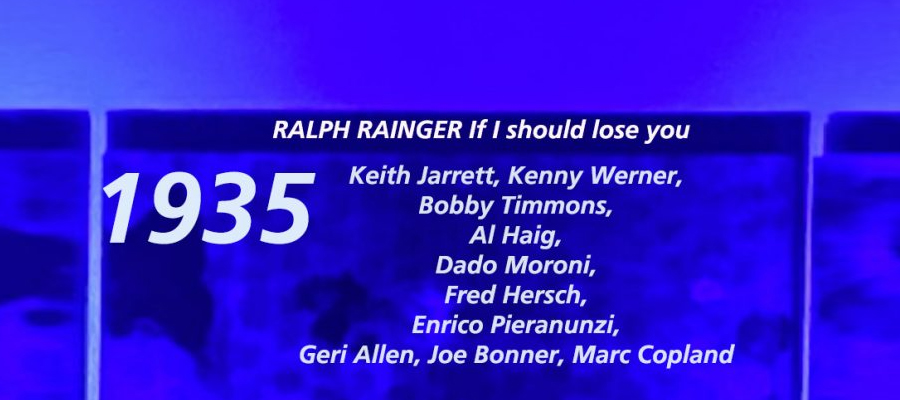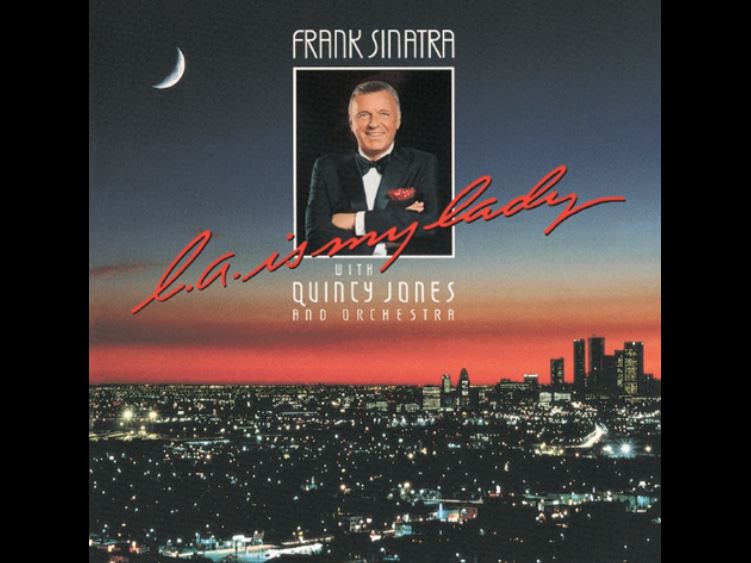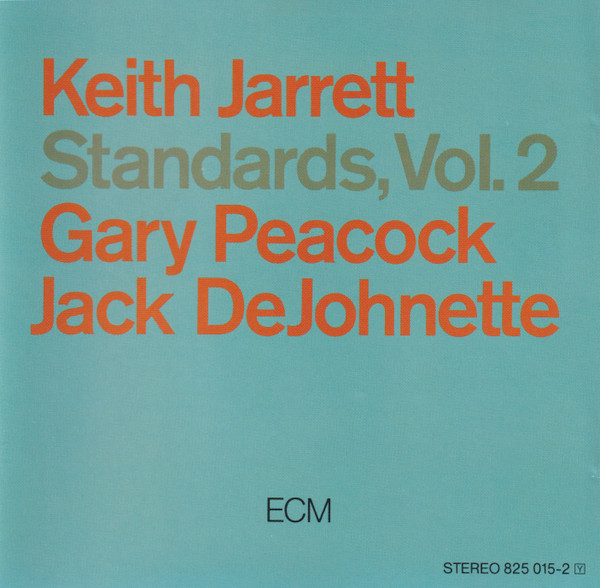Ralph Rainger If I should lose you
Ralph Rainger If I should lose you
The Great American Songbook Ralph Rainger If I should lose you (1935) Wikipedia (english) | Wikipedia (de)
Ralph Rainger Composer – Leo Robin Lyrics
Ralph Rainger If I should lose you – so richtig ein Song zum Heulen, schreibt Hans-Jürgen Schaal, Nina Simone hat ihn intoniert in den 60igern, Betty Carter mit Geri Allen in den 90igern, er wurde “zum Paradestück für Klaviertrio unter Keith Jarrett, Kenny Werner, Bobby Timmons, Al Haig, Dado Moroni, Fred Hersch, Enrico Pieranunzi, Geri Allen, Joe Bonner, Marc Copland und viele andere”. Siehe/höre Playlist
Und spätestens beim Keith Jarrett Trio und bei Kenny Werners COPENHAGEN CALYPSO weiß man, dass es sich hier um einen echten Standard handelt, bei dem die Frage nach Komponist und Texter und originaler Intention zweitrangig ist.
Hans Jürgen Schaal Jazzstandards S. 223
Interessant, wie Schaal den Mangel an Informationen zum Song kaschiert. Uns wundert allerdings auch, dass Wikipedia auf Englisch nur weitere Interpreten liefert, kaum Text, die deutsche Wikipedia dazu ist schlicht nicht zu finden, es bleibt nur standards.com, gleich auch mit Hinweis auf Chet Baker. Schaal zielt auf die Aufnahme DIANE ab aus dem Jahr 1985 mit Paul Bley in extrem langsamen Tempo – vielleicht ist das die zum Heulen Aufnahme – nun.
Charlie Parker tritt damit 1949 in Erscheinung, mit allem Bombast eines Streichorchesters mit Oboe und Harfe, eine, wie Schaal schreibt, halb-seriöse, halb peinliche Einspielung und doch beschäftigt sie eine Generation von Musikern und zieht einige Parker-Tributes nach sich, Hörbeispiele: Joe Pass (1979), Sadao Watanabe (1969) und James Zollar (1997).
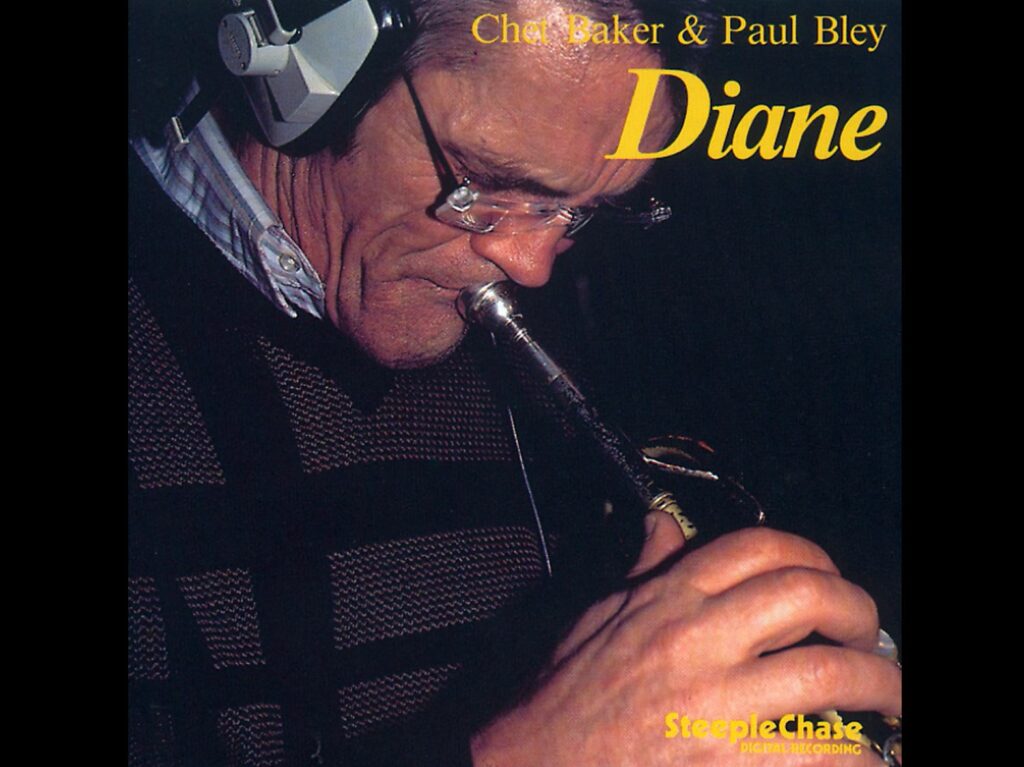
Die Informationslage zum Song ist tatsächlich zum Heulen. Du googlest den Song und bekommst gerade mal vier Seiten vorgeschlagen – Frank Sinatra ist wie immer dabei, Songtexte und Übersetzungen – bitte
If I should lose you | The stars would fall from the skies |
If I should lose you | The leaves would wither and die
The birds in Maytime | Would sing a lonely refrain
And I would wander around | Hating the sound of rain
With you beside me | No wind in winter would blow
With you beside me | A rose would bloom in the snow
I gave you my love | But I was living a dream
And living would seem in vain | If I lost you
Tja – was soll man dazu sagen, die blühende Rose im Schnee und kein Wind im Winter und – schau nochmal hin. Erste Zeile: If I should Lose – letzte Zeile If I lost you – Konjunktiv. Should lose – If I Lost. Sollte ich dich verlieren wäre es … so als ob und letzte Zeile: … wenn ich dich verloren hätte. Wir befinden uns in einer bedrohlichen Vorab-Situation, es könnte trostlos werden, es könnte der Wind nicht mehr wehen, aber noch ist alles wie es soll, zum Heulen daran ist: es bindet die Stimme jemanden an sich, indem sie erklärt, wie sehr der Sound vom Regen zu hassen wäre allein.
Dieser Text ist kein Lovely Song, er ist eher self-lost. Ohne dich wäre alles furchtbar. Aber wenn du nur da bleibst, ist alles wunderbar. With you beside me, a Rose would bloom in the snow. Das mit der Lovestory überlassen wir denen mit Herz – obwohl alles im Beside-Me-Beside-You-Zustand ist – und fragen: wo sind die Informationen zum Song?
Der Film Rose of the Rancho von 1936: eine romantische Komödie, ein Western. Erstverfilmung 1914 (sic!), für die 36iger Version entsteht der Song.
In den 1850er Jahren nutzt eine Bande Landräuber unter Joe Kincaid eine Gesetzeslücke, sich unrechtmäßig Land anzueignen, deren ursprüngliche Eigentümer offenbar keine gültigen Besitzurkunden innehaben – das bringt Rosita Castro, die Tochter des Großgrundbesitzers Pasqual Castro (mexikanische Namen), auf den Plan – sie verkleidet sich als Mann und organisiert eine Bürgerwehr.
Die Lovestory – nun – nicht wirklich. Die Informationslage – ja dürftig. Dafür eine Menge Pianisten. Trio-Musik und den Song kannst du bald mitsingen, auch ohne Jarrett. In Idealbesetzung, allein im Wind im Winter der Schnee und unter dem Schnee die blühende Rose – rosa.
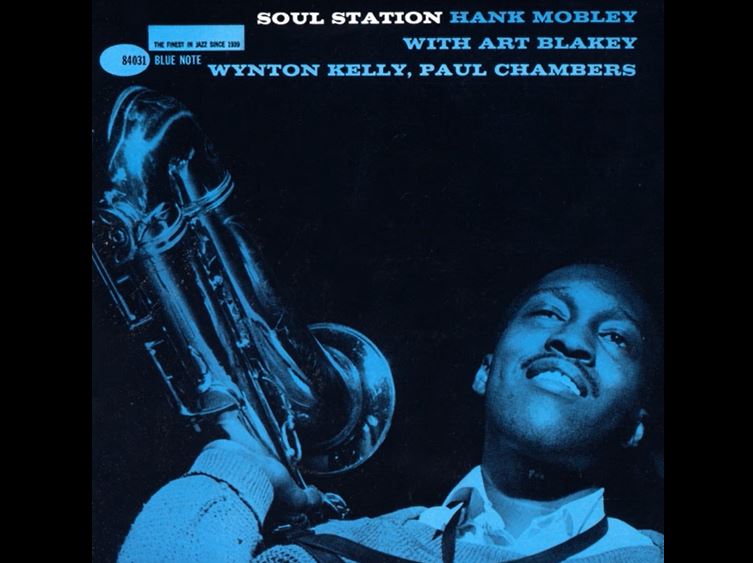
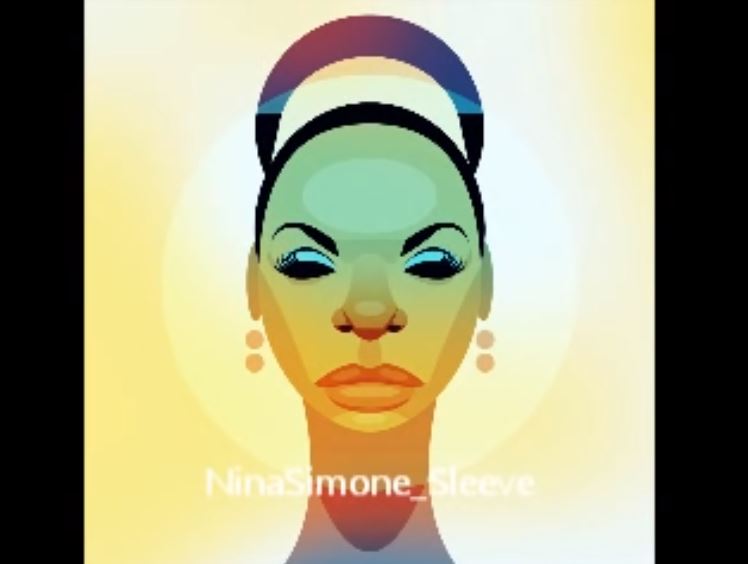
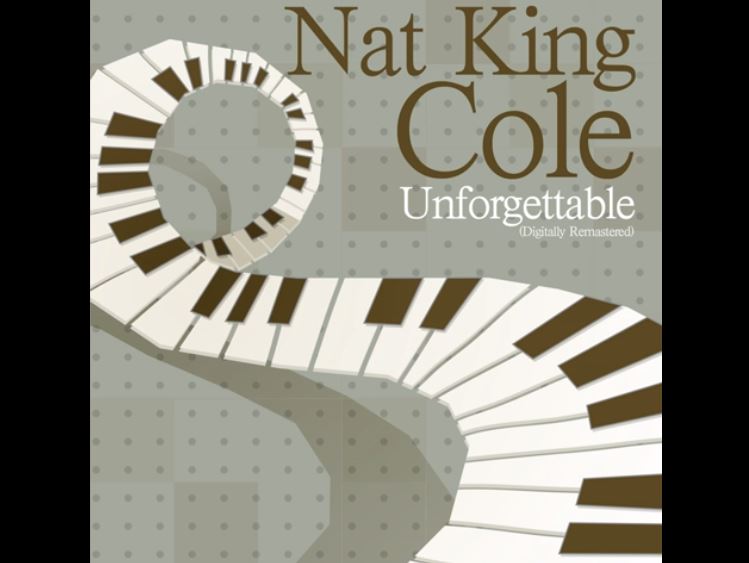
So far so long – noch Zweifel?
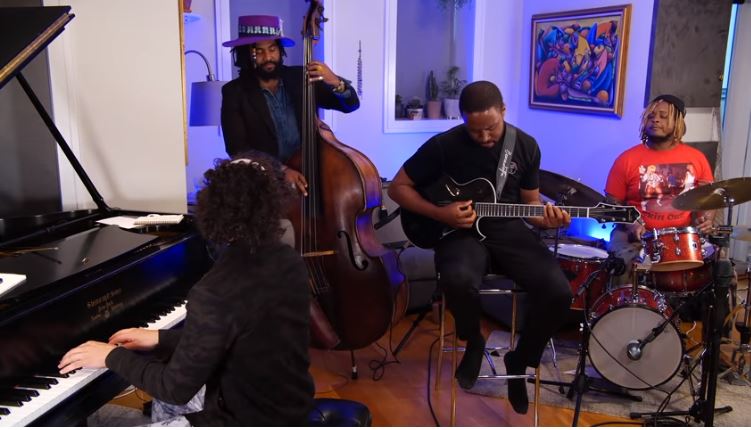
Ralph Rainger If I should lose you – Leo Robin
Keith Jarrett | Chick Core, Stefano Bollani | Oscar Peterson
Dieser Song also wird es wohl gewesen sein, da die Geigen in den Jazz Einzug fanden, die eine jahrzehntelang andauernde Diskussion entfacht, die Geigen als Orchestergraben, in dem der Jazz absumpft oder die Geigen aus dem Saxophon schreien oder das wars dann mit der Korruption – da kann man gleich auf Adorno zurückkommen und dem Jazz seine Asphalteigenschaften zurückwünschen.
In 1949 ist es der Jazz-Visionär – den haben wir nun auch vermisst: Norman Granz, der mit Charlie Parker alle Standards mit Geigenstreichern arrangieren lässt durch Jimmy Carroll – bedenkt man noch, dass der Song eigentlich zum Heulen ist, die Informationsdichte zum Song ebenfalls zum Heulen ist, können wir uns so einige Beispiele zum Heulen vornehmen, wenn nicht, ja wenn nicht die Pianisten auch Gefallen an ihm gefunden hätten. Suche auch: die Version von Carmen McRae – die zweite First Lady neben Ella Fitzgerald.
Suche auch: die Version von Jane Ira Bloom und werde nicht fündig, suche nach Dena DeRose und Philip Catherine – und werde fündig (aufgenommen in die Tidal-Playlist).
Keith Jarrett – Standards Volume 2 1985 | Ralph Rainger If I should lose you Wikipedia
Chick Core, Stefano Bollani – Orvieto 2011 -Ralph Rainger If I should lose you Wikipedia
Marian McParland Live at Yoshi’s Nitespot 1995 Ralph Rainger If I should lose you Wikipedia
Jacob Karlzon Trio Today 2004 Ralph Rainger If I should lose you
Jacobkarlzon.com
Oscar Peterson If You could See Me Now 1983 Ralph Rainger If I should lose you Wikipedia

Ralph Rainger If I should lose you Leo Robin – Great American Songbook
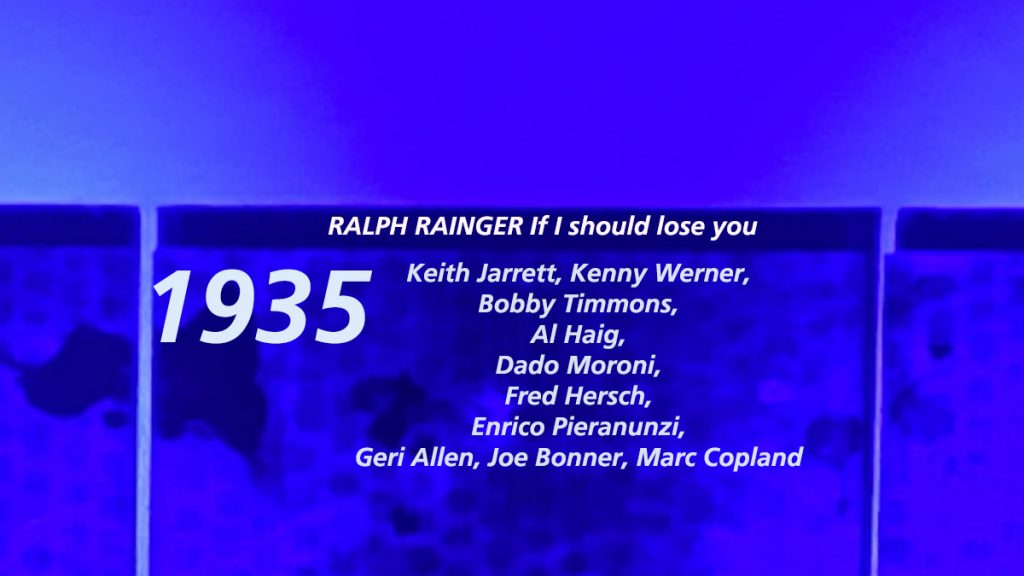
English Version
If I should lose you – such a piece to cry about, writes Hans-Jürgen Schaal, Nina Simone intoned it in the 60s, Betty Carter with Geri Allen in the 90s, it became “a showpiece for piano trio under Keith Jarrett, Kenny Werner, Bobby Timmons, Al Haig, Dado Moroni, Fred Hersch, Enrico Pieranunzi, Geri Allen, Joe Bonner, Marc Copland and many others”. See/listen to playlist
And at the latest with the Keith Jarrett Trio and Kenny Werner’s COPENHAGEN CALYPSO you know that this is a real standard, where the question of composer and lyricist and original intention is secondary.
Hans Jürgen Schaal Jazz Standards p. 223
Interesting how Schaal conceals the lack of information about the song. However, we are also surprised that Wikipedia in English only provides further interpreters, hardly any text, the German Wikipedia on this is simply not to be found, there remains only standards.com, immediately also with reference to Chet Baker. Schaal aims at the recording DIANE from 1985 with Paul Bley in extremely slow tempo – maybe this is the recording to cry – well.
Charlie Parker makes his appearance with this in 1949, with all the bombast of a string orchestra with oboe and harp, a semi-serious, semi-awkward recording, as Schaal writes, and yet it engages a generation of musicians and draws several Parker tributes, audio examples: Joe Pass (1979), Sadao Watanabe (1969), and James Zollar (1997).
The information situation to the song is actually to cry. You google the song and get just four pages suggested – Frank Sinatra is there as usual, lyrics and translations – please
If I should lose you | The stars would fall from the skies |
If I should lose you | The leaves would wither and die
The birds in Maytime | Would sing a lonely refrain
And I would wander around | Hating the sound of rain
With you beside me | No wind in winter would blow
With you beside me | A rose would bloom in the snow
I gave you my love | But I was living a dream
And living would seem in vain | If I lost you
Well – what to say, the blooming rose in the snow and no wind in winter and – look again. First line: If I should Lose – last line If I lost you – subjunctive. Should lose – If I Lost. Should I lose you it would be … as if and last line: … if I lost you. We are in a threatening pre-situation, it could become bleak, the wind could stop blowing, but still everything is as it should be, to cry about it is: it binds the voice to someone by declaring how much the sound would be to hate from the rain alone.
This text is not a Lovely Song, by no means, it is rather encroaching and self-lost. A vicious condition. Without you everything would be terrible. But if you just stay there, everything is wonderful. With you beside me, a rose would bloom in the snow. We leave the languishing love story to those with open hearts – although everything is in the Beside-Me-Beside-You state – so everything is fine – and ask: where is the information about the song?
The 1936 film Rose of the Rancho: a romantic comedy, a western. First filmed in 1914 (sic!), the song is created for the 36th version.
In the 1850s, a gang of land robbers led by Joe Kincaid takes advantage of a loophole in the law to illegally appropriate land whose original owners apparently do not hold valid title deeds – this sets off Rosita Castro, daughter of big landowner Pasqual Castro (Mexican names) – she disguises herself as a man and organizes a vigilante group.
The love story – well – not really. The information situation – yes meager. A lot of pianists for that. Trio music and you can soon sing along to the song, even without Jarrett. In ideal cast, alone in the wind in winter the snow and under the snow the blooming rose – pink.
So it will probably have been this song, since the violins found their way into jazz, that sparks a decades-long discussion, the violins as an orchestra pit, in which jazz sinks or the violins scream out of the saxophone or that’s it with the corruption – there you can come right back to Adorno and wish jazz back its asphalt properties.
In 1949 it is the jazz visionary – we have now also missed: Norman Granz, who with Charlie Parker has all standards arranged with violin strings by Jimmy Carroll – if one still considers that the song is actually to howl, the information density to the song is also to howl, we can take so some examples to howl, if not, yes, if not the pianists would have also taken a liking to him. Search also: the version of Carmen McRae – the second First Lady next to Ella Fitzgerald.
Search also: the version of Jane Ira Bloom and do not find, search for Dena DeRose and Philip Catherine – and find (included in the Tidal playlist).
Have a look for:
- The Great American Songbook
- Jimmy van Heusen It could happen to you
- Sammy Cahn I Should Care
- Fats Waller Honeysuckle Rose
- Stephen Sondheim Send in the Clowns
- Jerome Kern Long ago and far away
- Gus Arnheim Sweet and Lovely 1931
- Horace Silver Sister Sadie 1959
- Joseph Kosma Autumn Leaves
- Tunes and Explorations Florian Ross Octet
- Keith Jarrett Standards
